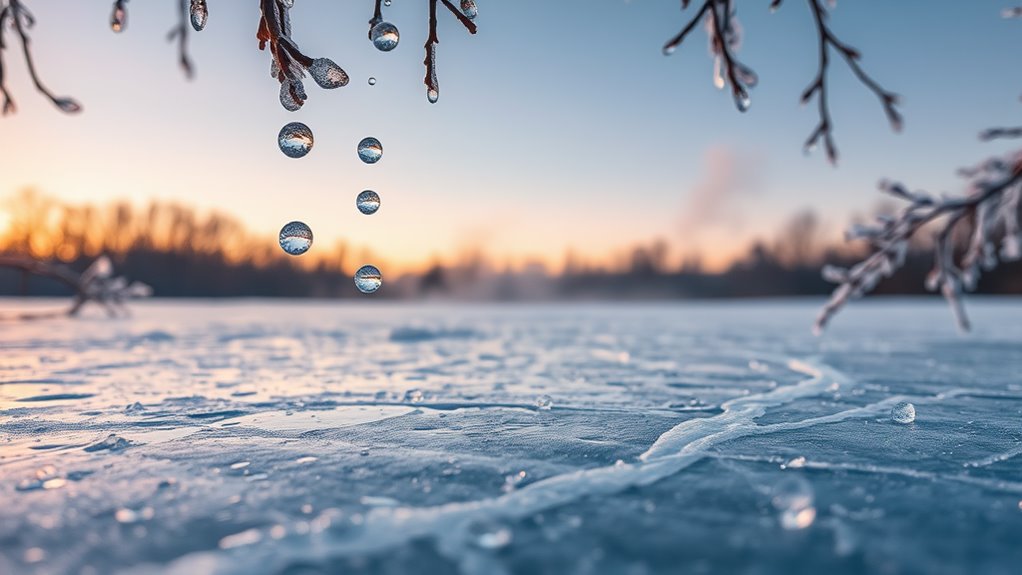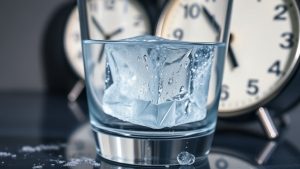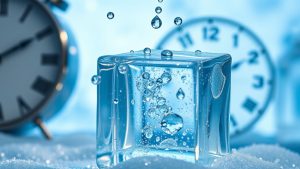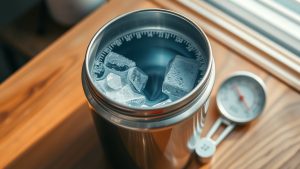
Water typically takes about 3-4 hours to freeze in your home freezer. However, factors like temperature, the volume of water, and the type of container can all affect this time. Smaller amounts of water, like those in ice cube trays, can freeze in just 1-2 hours, while larger containers take longer. Want to know why these factors matter and if there are any surprising exceptions? There's more to discover about freezing water!
Have you ever wondered how long it takes for water to freeze? The answer isn't straightforward, as several factors influence the freezing time. Generally, in a typical home freezer, it takes about 3-4 hours for a container of water to freeze solid. However, this time can vary considerably based on specific conditions.
Temperature plays a vital role. The colder the environment, the faster water freezes. When you place water in a freezer set at 0°F, it'll freeze quicker than if you were to leave it out on a chilly day at 32°F. Similarly, the volume of water matters. Smaller amounts, like ice cube trays, freeze in about 1-2 hours, while larger containers take longer due to the increased amount of heat that needs to be removed.
Temperature and volume significantly affect freezing time; smaller amounts freeze faster than larger ones in colder environments.
The material of the container also impacts freezing time. Metal conducts heat better than plastic, so water in a metal container will freeze faster. If you're looking to speed up the process, you might want to use a shallow tray instead of a deep bowl. Shallow water has a larger surface area, allowing it to lose heat more rapidly than deeper volumes.
Agitation can enhance freezing as well. Stirring water helps distribute temperature evenly, reducing the likelihood of warmer spots that could delay the freezing process. Additionally, environmental conditions like humidity and airflow can affect how quickly heat escapes from the water. In dry conditions, evaporation can occur faster, which might reduce the volume of water that needs to freeze.
Interestingly, there's a phenomenon known as the Mpemba effect, where hot water can freeze faster than cold water under certain circumstances. This counterintuitive result is still a topic of research, but it suggests that the initial conditions of the water can considerably influence freezing rates. Factors such as the amount of water and the surrounding temperature can significantly affect freezing time.
When you think about practical applications, understanding freezing is essential for preventing issues like pipe freezing in winter. Techniques such as insulation and automatic valves can help regulate temperature and prevent water from freezing in pipes. In industrial settings, advancements are often made to optimize freezing processes, making it vital to know how various factors interplay.
At a molecular level, freezing involves crystallization. As water loses heat, it forms ice crystals, altering from a liquid to a solid state. The efficiency of this process depends on thermal resistance and the laws of thermodynamics.
Mathematical models can predict freezing times based on thermal properties, but real-world variations often challenge these theories.
Conclusion
In conclusion, the speed at which water freezes varies based on several factors, like temperature and volume. However, you can generally expect a standard ice tray to yield frozen cubes in about three to four hours. So, if you're planning a chilly celebration or simply need some cool refreshment, patience pays off! Remember, the science of freezing fascinates, so next time you pop those trays in, marvel at the magic of Mother Nature's icy touch.



